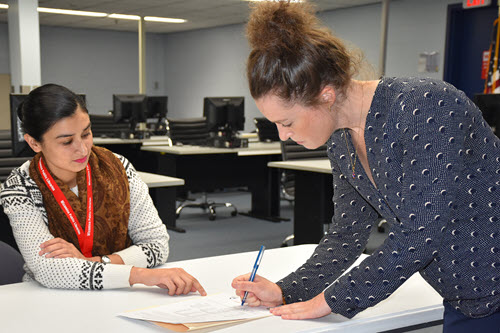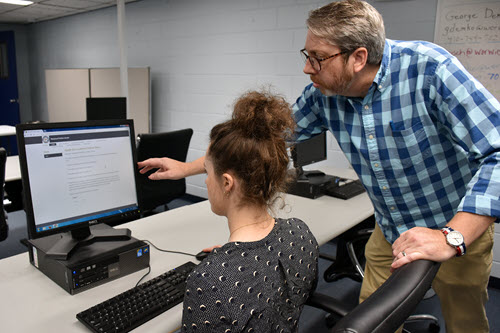Cyber Legal Clinics Create Access to Employment at Wicomico Public Libraries
This article is part of a series on public library strategies for supporting Access to Civil Legal Justice as part of a national training initiative. OCLC’s WebJunction program and the nonprofit organization, Legal Services Corporation (LSC), partnered to design and deliver a national online training course to public library staff that strengthens access to civil legal justice through public libraries.
Free legal representation can be hard to access in rural communities and filing legal documents without representation can be costly and confusing. To improve access to civil legal justice for low-income community members, Wicomico Public Libraries partnered with the Maryland Volunteer Lawyers Service to create the cyber legal clinic, “Legal Clinic @ YOUR Library.” Participants attend clinics in person at Wicomico Public Libraries (WPL) Downtown Branch and connect with Baltimore lawyers remotely using Google Hangouts to receive full civil legal representation free of charge.
Identifying Community Needs
Wicomico County is a mostly rural setting situated on the Eastern Shore of Maryland with three library branches that serve communities predominantly at or below the poverty level. One of the many services that WPL manages is a Job Search Center, which provides community members with free employment search support. 
One option for overcoming this employment challenge is to expunge their record. Expungement is a legal process that erases or seals a job seeker’s prior criminal records, meaning that they no longer need to disclose successfully expunged items from their record during a job search.
But filing for expungement can be expensive and confusing without legal guidance. Many people can’t afford the $30 fee per expungement—particularly if they need to remove multiple items from their record. Scott Mahler, WPL Adult Services Manager, first searched locally for free legal services to help address this problem but found few resources in the area.
Partnership and Collaboration
Expanding his search, Mahler contacted the Baltimore-based Maryland Volunteer Lawyers Service (MVLS)—a nonprofit organization that connects low-income Marylanders with volunteer lawyers to deliver free civil legal assistance—to brainstorm how to best connect rural low-income residents to free legal representation. Susan Francis, Executive Director of MVLS, proposed a remote, cyber clinic model using video conferencing so that lawyers in Baltimore (two hours away from Wicomico County) could reach clients without having to travel.
With this partnership in place, WPL began offering “Legal Clinic @ YOUR Library,” which is held bimonthly for two hours in the library’s computer lab. After signing in and submitting their intake form, participants are set up at a computer station with headsets to meet with a paralegal and then an MVLS lawyer using Google Hangouts to discuss their case. If a client meets the income qualification requirement, all services are provided free of charge. “The clients through Wicomico libraries have been very receptive to using this remote process,” says Francis, “and often seem a bit surprised that they really are speaking to and getting help from an attorney.”
Impact
The impact of the Wicomico cyber legal clinics has been remarkable. Since the clinics began, MVLS has assisted 182 individuals with 322 legal issues. Of those 182 individuals served, 169 received legal representation to have eligible items removed from their records. 
Mahler adds that holding these clinics in a library helps participants feel more comfortable: “An experience like this feels more personal through the library. At the end of a session, you can see the relief on people’s faces,” Mahler reflects. “They’ve been needing to do this for a long time but needed help overcoming those initial financial barriers. At the end of the clinic people hug us, and they cry, we cry. The day of the clinic is great, which is telling us that we’re doing something right for our community.”
Getting started
Scott Mahler and Susan Francis share their advice for other public libraries—particularly small and rural libraries—considering a similar web-based legal clinic program:
- Partnership—Mahler (WPL): “Look to larger towns or cities to see what volunteer or free legal services are available as potential partners. With the technology resources available now, connecting rural libraries to services more readily available in big cities shouldn’t be as much of a barrier.”
- Personalized strategy—Francis (MVLS): “I would suggest that libraries really think about what gaps they are seeking to fill. I encourage them to reach out to a legal services program and have a conversation with them about what issues your library is experiencing most often, and what resources may already exist.”
As a public community space, libraries are uniquely positioned to provide information and resources that can improve access to civil legal justice. Deciding how to do so can seem daunting—particularly for small and rural libraries—but finding the right partnership and determining your community’s most pressing civil legal needs can make important strides toward closing the justice gap.
